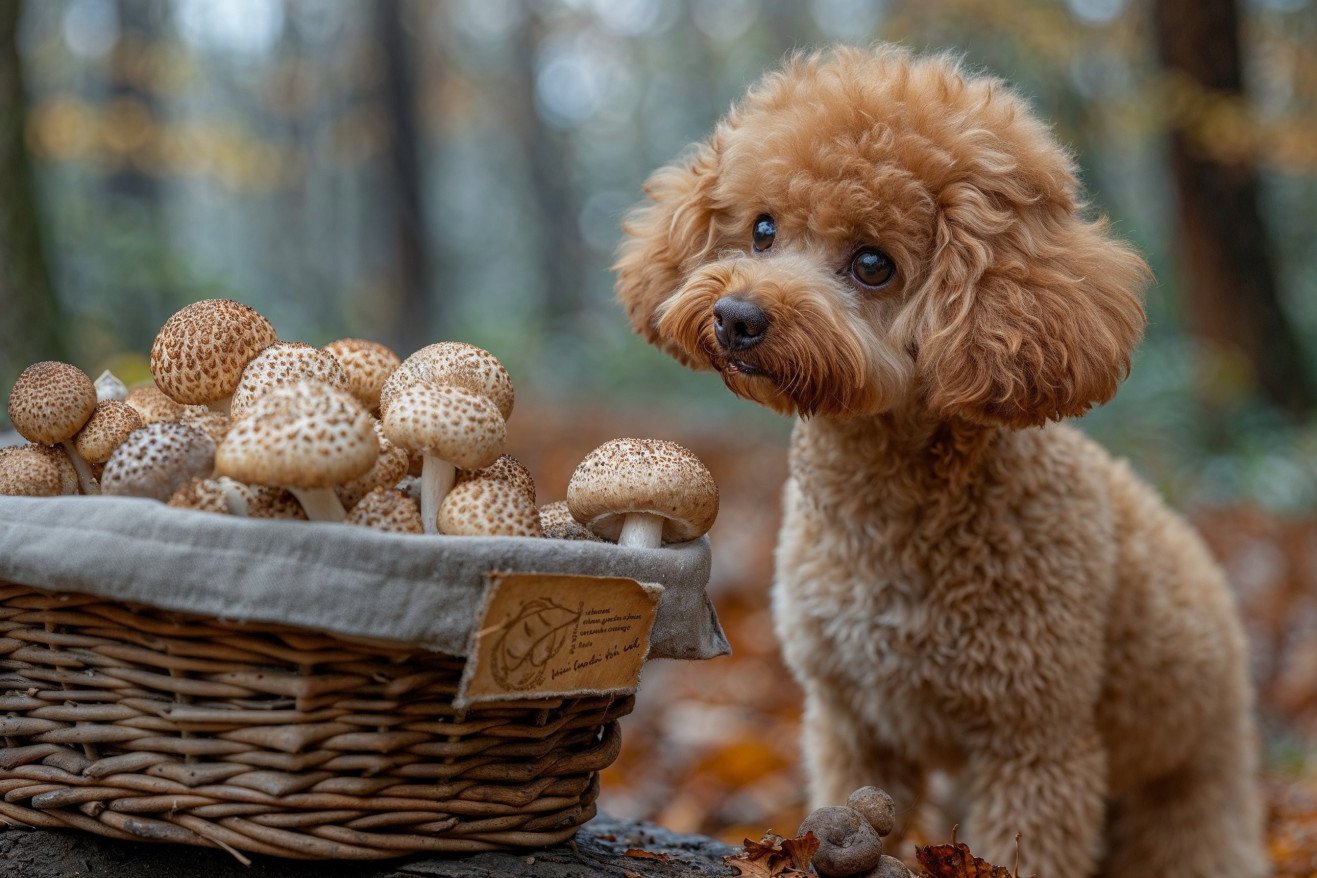Can Dogs Eat Mushrooms? Safe Varieties and Toxicity Risks
25 January 2024 • Updated 28 January 2024

Mushrooms are a tasty treat, but can our furry friends join in on the fun? The answer is yes, but with some caveats. While there are some mushrooms that are safe for dogs to eat, dogs can eat store-bought button, cremini, and portobello mushrooms as long as they are plain and cooked.
However, it’s important to avoid giving dogs wild mushrooms because they can be toxic. It’s also important to introduce mushrooms to your dog’s diet slowly and to talk to your vet before you do.
This article will take a deep dive into the topic of mushrooms and dogs, drawing on a variety of scientific research and expert opinions. It will look at veterinary science, toxicology, and dog nutrition to give a complete picture of the potential benefits and dangers of feeding mushrooms to dogs. By looking at this research, dog owners will be better able to decide whether or not to add mushrooms to their pet’s diet.
Can dogs eat mushrooms?
How to Make Mushrooms More Nutritious for Your Dog
While dogs can eat common store-bought mushrooms like white button, cremini, and portabella, they may not be able to get the most out of them nutritionally. Mushrooms are a good source of many nutrients, but their bioavailability—how well a dog’s body can absorb and use them—is a concern when it comes to feeding them to dogs.
These mushrooms can offer vitamins, minerals, healthy fats, and proteins, all of which can be good for dogs.
To make sure that dogs can get the most out of the mushrooms they eat, Dogs Naturally Magazine recommends cooking them to break down the chitinous wall of the fungi, which will make the nutrients more available and help to neutralize potentially toxic compounds like monomethyl hydrazine. In addition, PetMD says that medicinal mushrooms like turkey tail and reishi contain immune-boosting polysaccharides and beta-glucans.
That said, mushrooms should never be a dog’s main source of nutrition. Instead, they should be part of a balanced diet that includes other sources of nutrition.
Always talk to your vet before adding mushrooms to your dog’s diet to make sure they’re safe and appropriate for your dog’s specific health situation. With your vet’s help, you can make sure that you’re taking advantage of the health benefits of mushrooms while still making sure that your dog’s diet is well-balanced and nutritious.
How to Identify Safe Mushrooms for Dogs
If you’re thinking about adding mushrooms to your dog’s diet, it’s important to only choose mushrooms that are known to be safe. According to This Dog’s Life, some store-bought mushrooms, including white button, cremini, portobello, shiitake, and oyster mushrooms, are safe for dogs to eat when properly prepared. Safe mushrooms tend to be firm, have a consistent color, and lack the gills and skirts that are found on some toxic wild mushrooms.
To make mushrooms easier to digest and to help your dog’s body absorb their nutrients, it’s best to cook them before giving them to your dog. This will also help ensure that they’re safe for your dog to eat, as raw mushrooms can be hard for dogs to digest.
To be safe, feed your dog a small amount of cooked mushrooms that haven’t been cooked in oil or seasoned with spices or other flavorings, all of which can be toxic to dogs, according to Earth Buddy Pet.
It’s also a good idea to introduce mushrooms into your dog’s diet slowly so you can watch for any signs of an allergic reaction. While mushrooms can be a healthy addition to your dog’s diet, it’s important to feed them in moderation. For example, Thrive Dog Kitchen recommends feeding your dog one tablespoon of cooked mushrooms for every 5kg of their body weight.
While some mushrooms can be good for your dog, it’s important to remember that the dangers of wild mushrooms are real. Some wild mushrooms, including the Death Angel mushroom, are highly poisonous and can be deadly if your dog eats them, according to This Dog’s Life. That’s why it’s so important to keep your dog away from areas where they might be able to forage for mushrooms in the wild.
Toxic Mushrooms and Dogs
The world of mushrooms can be a dangerous place for dogs. Toxic mushrooms can cause serious health problems and even death. The symptoms of mushroom poisoning can be different but often include vomiting, diarrhea, drooling, weakness, loss of coordination, seizures, and in some cases, liver failure or a coma, according to VCA Animal Hospitals.
Because of the wide range of symptoms, it’s important to seek veterinary care as soon as possible if you suspect your dog has eaten a mushroom.
One of the biggest problems with toxic mushrooms is that they can look like many other types of mushrooms. According to Vets Now, you should assume that all wild mushrooms are toxic. However, toxic mushrooms can also grow in your backyard. This means that you need to watch your dog closely and make sure that your yard is free of mushrooms to prevent accidental poisoning.
Preventing mushroom poisoning isn’t just about treatment, it’s about making sure that you’ve set up an environment where the risk is low and your dog can explore without the danger of toxic mushrooms. Once you’ve done that, you can start to think about the potential health benefits of mushrooms that you’ve chosen for your dog.
How to Use Medicinal Mushrooms to Help Your Dog
Medicinal mushrooms are a natural way to help your dog, and each type offers different benefits. For example, reishi mushrooms are known for their immune-modulating effects, while Turkey Tail mushrooms are known for their immune-stimulating effects. Shiitake mushrooms, which have been shown to have anti-tumor and immune-stimulating effects, and Maitake mushrooms, which have anti-inflammatory and immune-stimulating effects, are also helpful, according to PetMD.
These mushrooms can be given to dogs in a variety of ways, including supplements, infused treats, broths, and topical treatments, and each method can be used to address different health concerns and comfort levels. Earth Buddy notes that it’s important to start with a low dose and work up to a higher dose under the care of a professional.
While there is limited research on the use of mushroom-based cancer therapies in dogs, studies have shown that mushrooms like Turkey Tail and Reishi have anticancer properties, as noted by PetMD. This indicates that medicinal mushrooms may be able to help dogs undergoing traditional cancer treatments when used under the care of a veterinarian.
It’s important to talk to a veterinarian who specializes in holistic medicine before giving your dog medicinal mushrooms. They can help you determine the right type and dose of mushrooms for your dog’s specific health concerns, which will help ensure that you’re using these natural remedies safely and effectively.
How Mushrooms Are Metabolized in Dogs
Mushroom metabolism in dogs is a complex process that has a number of physiological implications. When dogs eat mushrooms, the compounds in the mushrooms interact with the dog’s organ systems, which can have a number of effects on the dog’s health.
A study posted on PubMed found that mushroom toxicosis in dogs led to symptoms like gastroenteritis and elevated serum lipase activity, which shows that the compounds in toxic mushrooms can have a significant impact on a dog’s digestive and pancreatic health.
The dog’s digestive system is responsible for breaking down the mushrooms that the dog has eaten. The liver is responsible for metabolizing the toxins in some wild mushrooms, and this is especially important. An article in DVM360 explains that the consumption of toxic mushrooms, especially those that contain amatoxins, can lead to severe liver damage because of the rapid absorption and systemic distribution of these toxins.
While the interactions between mushroom compounds and common dog medications are not well-studied, researchers recommend that caution be taken when dogs that are on liver-metabolized medications eat mushrooms because of the potential role of the liver in mushroom metabolism.
In addition, dogs with pre-existing liver or kidney disease may be at greater risk when eating mushrooms, whether they are toxic or medicinal. This underscores the importance of talking to a vet before giving a dog mushrooms, especially if the dog has a pre-existing health condition.
Final Thoughts: Mushrooms in Your Dog’s Diet
In this article, we’ve taken a deep dive into the complex topic of dogs and mushrooms. The bottom line is that some store-bought mushrooms can be a nutritious addition to your dog’s diet if they are prepared properly—cooked and unseasoned. However, there is a big caveat: wild mushrooms are often toxic and should be avoided at all costs.
The difference between safe, store-bought mushrooms and toxic, wild mushrooms is extremely important. As we’ve learned, mushrooms can offer a lot of benefits, from their nutritional content to their medicinal uses, but the risks of poisoning from toxic mushrooms must be weighed against these benefits.
As with many things in life, the key is moderation and working with a vet. Always consult a professional before making any changes to your dog’s diet to make sure that any mushrooms you give them are safe and appropriate based on their unique health needs.
In conclusion, mushrooms can be a part of a healthy, balanced diet for dogs, but it’s important to make sure that any mushrooms you give them are safe, appropriate, and in their best interest.


